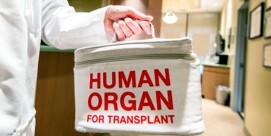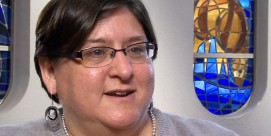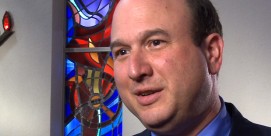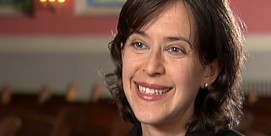Atonement and Forgiveness
BOB ABERNETHY: We want to explore the meaning of the day of atonement with Blu Greenberg, an Orthodox Jew from Rippendale, New York, a writer and advocate of greater opportunity for women within Orthodoxy; and with Rabbi Joel Tessler of Beth Shalom congregation in Potomac, Maryland, an Orthodox rabbi. Mrs. Greenberg, in these special days of Rosh Hashanah and Yom Kippur, how do you atone?
BLU GREENBERG (Author): Well, you begin to reflect on what ways your life went off track in the previous year and how you’d like it to be different. You begin to ask God for forgiveness, but you also have to ask your fellow human beings for forgiveness. In fact, the tradition teaches that God cannot forgive you for sins of commission against your partners on Earth until you seek forgiveness from them. So one of the tasks, a very difficult task, is to ask people who you’ve wronged for forgiveness.
ABERNETHY: You go to them, seek them out, and ask them to forgive you.
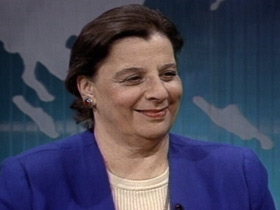
Ms. GREENBERG: That’s what you’re supposed to do. Not all of us do this as faithfully as we should. It’s tough.
ABERNETHY: Yes.
Rabbi JOEL TESSLER: In fact, as a rabbi, I must tell you that people assume that if they go to the synagogue and spend the entire day in fasting and prayer on Yom Kippur, that all their sins are sort of wiped clean; but in truth, as Blu says, it’s crucial to be able to seek out those who we think we’ve wronged in the course of the year and ask them personally.
ABERNETHY (To Rabbi Tessler): And once you’ve done that, then you go to a synagogue on Yom Kippur and what happens? How is the slate wiped clean?
Rabbi TESSLER: Well, the actual process is recorded by the rabbis in the Talmud as first, really recognizing what I’ve done as incorrect. Acknowledging that what I’ve done is incorrect. And then making a vidui, or a confession, after speaking the words of what I’ve done is incorrect, and then finally making a resolution in the future, I try not to do the same thing.
Actually, what’s most interesting, quite a few people come to me and say, “Rabbi, I’d rather stay home, or go to the beach. I can feel more spiritual and I can do some soul searching.” And one of the most important things in Judaism is what we call koach hatzibur, the power of the community. And I tell people if you don’t come to the synagogue, it’s a selfish act for the community, because we need you.
Ms. GREENBERG: There’s a confessional that’s part of the liturgy of Rosh Hashanah, and through the 10 days of penitence, and this confessional, a litany of sins, of misdeeds, sometimes misdemeanors is even ranging from acts of outright evil or lack of sympathy to such things such as haughtiness or superciliousness or uncaring, and these are all said in the plural, because there’s a sense that we’re all in this together.
ABERNETHY: If you know that if you ask forgiveness of others and if you ask forgiveness of God, then you go to synagogue on Yom Kippur, that you’re being forgiven, why not do whatever you want to all the rest of the year because you’re sure come Yom Kippur, you’re going to be forgiven?
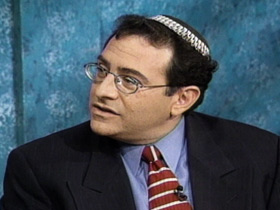
Rabbi TESSLER: That’s a great question. I’m sure many people would probably choose that avenue, but it doesn’t work that way. Primarily Judaism believes that the reward for a good deed is a good deed. The reward, or if you will, the opposite for an evil deed or something that’s a sin is in fact, it changes your personality. So although you can be forgiven, the opportunity for spiritual growth in Judaism is based upon what you do with your life, and the choice is that you have your free will.
ABERNETHY (To Ms. Greenberg): Does it ever happen for you that somebody comes to you and says, “Forgive me,” and you just can’t do it?
Ms. GREENBERG: I’m so happy that some people have not come to me to ask for forgiveness. I’d be really hard pressed in a situation, where, you know, there’s some people who you just — but on the other hand, it’s quite amazing how you can find it in your own heart and how the act of asking forgiveness sometimes pushes you to a new place inside yourself. It’s really — I’m sorry, Joel.
Rabbi TESSLER: No. Let me tell you a quick story. My daughter is seven years old, and a little girl threw a stick at her and actually hurt her on the playground. Just yesterday she got a little note from the little girl in the big penmanship saying, “Dear Safira, it’s before Rosh Hashanah and I just want to say I’m sorry.” There it is, at seven years old they learn. You’ve got to turn to somebody else and say “I’m sorry” when you did something wrong.
ABERNETHY: Rabbi Tessler, Mrs. Greenberg, good — thank you so much.

